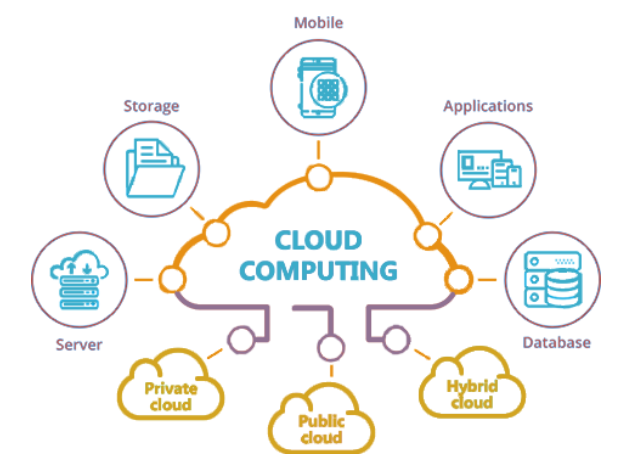Cloud computing has revolutionized the way businesses operate in the modern digital era. It has become a vital part of the technological landscape, offering companies new opportunities to enhance their efficiency, reduce costs, and increase agility. In this blog, we will explore the intricacies of cloud computing, its benefits, and how it has changed the world we live in.
What is Cloud Computing?
Cloud computing is a model for delivering computing services over the internet. It allows users to access a range of computing resources, such as servers, storage, databases, and software applications, without having to own or manage the infrastructure themselves. Instead, they rely on third-party providers who operate and manage the cloud infrastructure on their behalf.
The main advantage of cloud computing is that it offers a flexible and scalable way of using computing resources. Users can quickly and easily scale up or down their resource usage based on their needs, paying only for what they use. Cloud computing also offers a high degree of reliability, security, and performance, which makes it an ideal solution for businesses of all sizes.
Types of Cloud Computing
Cloud computing can be divided into three main categories: Infrastructure as a Service (IaaS), Platform as a Service (PaaS), and Software as a Service (SaaS).
Infrastructure as a Service (IaaS) refers to the provision of virtualized computing resources over the internet. This includes servers, storage, and networking components, which are managed and maintained by the cloud provider. IaaS allows users to build and manage their own applications, giving them full control over the infrastructure.
Platform as a Service (PaaS) provides users with a complete platform for developing and deploying applications. This includes the hardware, operating system, and software development tools needed to build and run applications. PaaS allows users to focus on developing their applications without having to worry about the underlying infrastructure.
Software as a Service (SaaS) refers to the delivery of software applications over the internet. This includes applications such as email, word processing, and accounting software. SaaS applications are hosted and managed by the cloud provider, and users access them through a web browser or application interface.
Benefits of Cloud Computing
Cloud computing offers a range of benefits to businesses of all sizes. Here are some of the key advantages of cloud computing:
- Cost-Effective: Cloud computing allows businesses to reduce their IT costs by eliminating the need to invest in and maintain their own hardware and software infrastructure.
- Scalability: Cloud computing enables businesses to quickly and easily scale their computing resources up or down as needed, providing greater flexibility and agility.
- Reliability: Cloud providers offer a high level of reliability and availability, with uptime guarantees that are often better than what businesses can achieve with their own infrastructure.
- Security: Cloud providers offer robust security measures and data protection, ensuring that data is kept safe and secure.
- Accessibility: Cloud computing allows users to access computing resources from anywhere with an internet connection, making it easier to collaborate and work remotely.
- Innovation: Cloud computing enables businesses to experiment with new technologies and innovation, without having to invest in expensive infrastructure or technology.
Cloud Computing Use Cases
Cloud computing has been adopted by a wide range of businesses across various industries. Here are some of the most common use cases of cloud computing:
- Infrastructure as a Service (IaaS): IaaS is commonly used by businesses that need to scale their computing resources quickly and easily, such as startups or seasonal businesses.
- Platform as a Service (PaaS): PaaS is commonly used by software development teams who need a complete platform for developing and deploying applications.
- Software as a Service (SaaS): SaaS is commonly used by businesses that need access to software applications, such as email, accounting software, or customer relationship management (CRM) software.
- Big Data Analytics: Cloud computing is also ideal for big data analytics, as it enables businesses to process large amounts of data quickly and efficiently. This is particularly useful for businesses in industries such as finance, healthcare, and retail.
- Disaster Recovery and Backup: Cloud computing also offers an effective solution for disaster recovery and backup. By storing data in the cloud, businesses can ensure that their data is protected and easily recoverable in the event of a disaster or system failure.
- Internet of Things (IoT): Cloud computing is also well-suited for IoT applications, as it enables businesses to collect and analyze data from IoT devices in real-time. This is particularly useful for businesses in industries such as manufacturing, logistics, and transportation.
- Artificial Intelligence and Machine Learning: Cloud computing also provides an ideal platform for artificial intelligence and machine learning applications. This enables businesses to leverage advanced algorithms and models to gain insights from their data and make better decisions.
Cloud Computing Providers
There are several cloud computing providers in the market today, with the three largest being Amazon Web Services (AWS), Microsoft Azure, and Google Cloud Platform. These providers offer a range of services and solutions, from basic infrastructure to advanced analytics and artificial intelligence.
AWS is the oldest and largest cloud provider, with a wide range of services and solutions. Microsoft Azure is another popular cloud provider, particularly for businesses that use Microsoft products such as Office 365. Google Cloud Platform is a newer entrant in the market, but it has gained traction with its advanced analytics and machine learning capabilities.
Conclusion
Cloud computing has transformed the way businesses operate in the modern digital era. It offers a flexible, scalable, and cost-effective way of using computing resources, enabling businesses to focus on their core operations and drive innovation. With a range of benefits and use cases, cloud computing is now an essential part of the technological landscape, and its adoption is only set to grow in the future.









